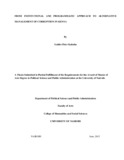| dc.description.abstract | Since independence, corruption in Kenya has assumed an incrementally progressive trajectory,
almost in tandem with the escalation of measures to tackle it. This study therefore interrogates
the appropriateness of the current anti-corruption policy implementation approaches within the
contemporary political economy context. The proposition herein was that the current less than
efficient elite-driven and rent-seeking anti-corruption policy implementation strategies and
processes, that are embedded in current anti-corruption approaches, further identified as a
“Logframes”, have been responsible for the observed challenges facing the anti-corruption war
in Kenya. To effectively interrogate underlying domestic and systemic factors, the study has
utilized the Elite Theory to explain the observed disconnect between the current institutional and
programmatic approaches to the management of corruption in Kenya and their expected
effectiveness. In addition to available secondary data on the subject from books, journals, media,
and official government and international organizations’ reports, the study has also used nonprobability
generated primary data through self-administered interview guides that were
procured from subject-area experts in relevant government enforcement, oversight, advocacy,
watchdog, institutions and organizations. The study has analytically identified the existence of
the above referred ‘Logframes’ at both the local and international levels as being the singularly
fundamental impediment to the success of the current approaches to the management of
corruption in Kenya and consequently recommends resolute and graduated governmental efforts
in the removal of the same as the way forward which constitutes the alternative approach | en_US |

